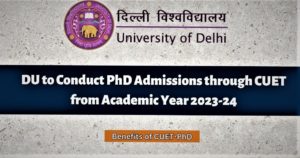Delhi University to Provide PhD Admissions Through CUET 2023

Delhi University to Integrate CUET for PhD Admissions in the Upcoming Academic Year: A New Era of Streamlined Selection
The Delhi University (DU) will be providing PhD admissions through the Common University Entrance Test (CUET) from the upcoming academic year, 2023-24. This decision was taken by the university’s Executive Council (UEC) in a meeting held on Friday. The CUET (PhD) will be a national-level entrance test conducted by the National Testing Agency (NTA). The test will be held in multiple sessions across the country. The test will be designed to assess the aptitude and knowledge of the candidates for PhD programmes. The CUET (PhD) will be a computer-based test. The test will consist of multiple-choice questions (MCQs) and a few descriptive questions. The duration of the test will be three hours.
Table of Contents
The CUET (PhD) will be conducted in two parts. The first part will be a general test, which will be compulsory for all candidates. The second part will be a subject-specific test, which will be optional for candidates who are applying for PhD programmes in specific subjects. The CUET (PhD) score will be used by the DU to shortlist candidates for PhD programmes. The final selection of candidates will be based on their academic performance, research experience, and interview performance.
The decision to conduct PhD admissions through the CUET has been welcomed by many students and academicians. They believe that the CUET will help to create a level playing field for all candidates, irrespective of their background or location. They also believe that the CUET will help to improve the quality of PhD admissions in the country. However, some students and academicians have expressed concerns about the CUET. They believe that the CUET is not a good measure of a candidate’s aptitude for PhD studies.
They also believe that the CUET will make it difficult for students from rural areas and marginalized sections of society to get admission to PhD programmes. The DU has assured that all concerns will be addressed. The university has said that it will provide adequate support to students from rural areas and marginalized sections of society to help them prepare for the CUET. The decision of the DU to conduct PhD admissions through the CUET is a significant step. It is a step towards making PhD admissions more merit-based and transparent. It is also a step towards improving the quality of PhD admissions in the country.

What Is CUET?
The Common University Entrance Test (CUET) is a national-level entrance exam conducted by the National Testing Agency (NTA) for admission to undergraduate (UG) and postgraduate (PG) courses in various central and state universities across India. The CUET was first conducted in 2022 and is now being conducted annually.
The CUET is a computer-based test (CBT) that is divided into three sections:
- Section I: General Test – This section is compulsory for all UG and PG candidates and consists of questions on English, reasoning, and mathematics.
- Section II: Subject-specific Test – This section is optional for UG candidates and is divided into 27 subjects. Candidates can choose to appear for any number of subject-specific tests, depending on the courses they are applying for.
- Section III: Language Proficiency Test – This section is optional for PG candidates who are applying for courses that require proficiency in a foreign language. The language proficiency test consists of questions on a foreign language of the candidate’s choice.
The CUET is a multiple-choice question (MCQ) test with a total of 100 questions. The duration of the test is 2 hours in general. The CUET scores are used by participating universities to shortlist candidates for admission. The final selection of candidates is based on their CUET scores, academic performance, and interview performance (if required). The CUET is a major step towards making the admission process to central and state universities more fair and transparent. The CUET is also expected to increase the number of students from rural and underserved areas who are able to access higher education.
Benefits of the CUET:
- It is a national-level exam, which means that students from all over the country can take it. This helps to create a level playing field for all students, regardless of their location.
- It is a computer-based test, which is more convenient for students and reduces the chances of cheating.
- It is a multiple-choice question (MCQ) test, which is easier to prepare for than a traditional essay-based exam.
- The CUET scores are used by participating universities to shortlist candidates for admission. This helps to ensure that only the most qualified students are admitted to these universities.
The CUET is a new exam, so there are still some challenges that need to be addressed. For example, the cost of taking the CUET can be a barrier for some students. Additionally, the CUET scores may not be a perfect measure of a student’s aptitude for a particular course. However, the CUET is a step in the right direction and is likely to improve the quality of education in India.
Key points about the integrated PHD CUET 2023
- The CUET (PhD) will be a national-level entrance test conducted by the NTA.
- The test will be held in multiple sessions across the country.
- The test will be designed to assess the aptitude and knowledge of the candidates for PhD programmes.
- The CUET (PhD) will be a computer-based test.
- The test will consist of multiple-choice questions (MCQs) and a few descriptive questions.
- The duration of the test will be three hours.
- The CUET (PhD) will be conducted in two parts. The first part will be a general test, which will be compulsory for all candidates. The second part will be a subject-specific test, which will be optional for candidates who are applying for PhD programmes in specific subjects.
- The CUET (PhD) score will be used by the DU to shortlist candidates for PhD programmes.
- The final selection of candidates will be based on their academic performance, research experience, and interview performance.
The introduction of CUET for PhD admissions brings several benefits for prospective candidates. Firstly, it simplifies the application process, eliminating the need to navigate multiple application portals and requirements. Secondly, candidates gain access to a wide array of PhD programs offered by Delhi University, enabling them to make informed choices based on their research interests. Lastly, the standardized entrance examination ensures an objective evaluation of candidates’ abilities, ensuring that deserving individuals are selected for the PhD programs.

Overview
Delhi University’s decision to incorporate CUET for PhD admissions reflects its commitment to improving the efficiency and transparency of the admissions process. By embracing this partnership, the university aims to attract exceptional scholars from diverse backgrounds and regions, fostering an inclusive and intellectually vibrant research community. This initiative will further solidify Delhi University’s position as a premier institution for higher education and research in India, driving the advancement of knowledge and innovation.
Stay update and tuned with our more articles by click over this link
